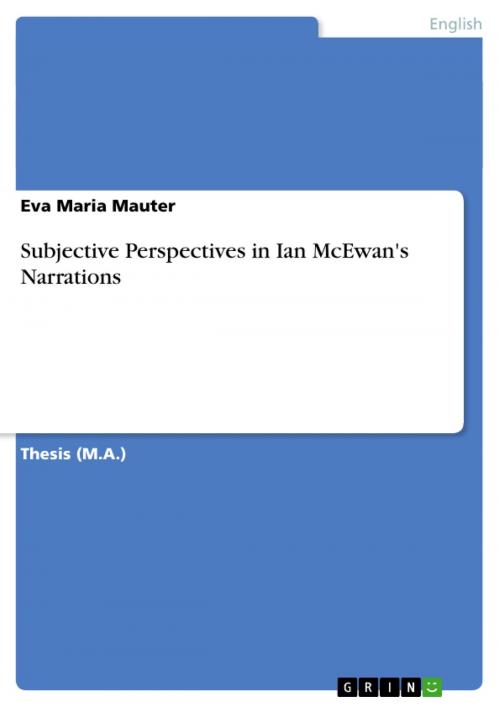Subjective Perspectives in Ian McEwan's Narrations
Fiction & Literature, Literary Theory & Criticism, British| Author: | Eva Maria Mauter | ISBN: | 9783640103263 |
| Publisher: | GRIN Publishing | Publication: | July 14, 2008 |
| Imprint: | GRIN Publishing | Language: | English |
| Author: | Eva Maria Mauter |
| ISBN: | 9783640103263 |
| Publisher: | GRIN Publishing |
| Publication: | July 14, 2008 |
| Imprint: | GRIN Publishing |
| Language: | English |
Thesis (M.A.) from the year 2006 in the subject English Language and Literature Studies - Literature, grade: 1,3, University of Paderborn, 205 entries in the bibliography, language: English, abstract: Ever since McEwan's first publications, his work has received considerable attention from critics and scholars. Thus, it is not surprising that McEwan has been awarded with a number of prizes for his work and that he has been praised to be one of the leading representatives of the young generation. Despite the extraordinary praise of McEwan's work, it has been discussed most controversially. The fact that he often engages taboo subjects like masturbation, incest, regression, child abuse, dismemberment, sadism-masochism etc. earned McEwan the reputation of an author who writes to shock his audience. McEwan himself appears to be surprised about these attributions and objects them. However, it seems to be undisputable that the narrations are extremely shocking but it seems that not only the choice of topics is responsible for the extreme response to McEwan's narrations. In my opinion, the shock value of McEwan's narrations is mainly caused by his particular way to present these topics. In keeping with this, I consider the form of McEwan's narrations to be as important as their content. McEwan seems to experiment with the employment of perspectives, subjective perspectives in particular. In fact, it can be argued that he taps the full potential of the employment of subjective perspectives in his narrations as the reader is confronted with the subjectivity of perspectives on all levels of textual communication. In my opinion, McEwan's most outstanding accomplishment is his ability of depicting subjective perspectives in all consequence. The absence of morality in many of McEwan's narrations, for example, which is usually regarded as an underlying topic, can also be seen as a result of depicting consistently a specific subjective perspective. Therefore, this paper will examine the subjective perspectives in McEwan's narrations in all detail. The nature of the subjective perspective has not been examined at large in narratology, although parts of this issue have been discussed thoroughly e.g. 'unreliable narration', 'perspectives' or the 'subjective novel', etc. An applicable structure for analysing the subjective perspective on all levels of textual communication is inexistent so far. However, such a structure is required for analysing the subjective perspectives in McEwan's narrations and therefore it will be developed in the frame of this thesis. This new developed structure could also prove to be valuable in textual analysis in general.
Thesis (M.A.) from the year 2006 in the subject English Language and Literature Studies - Literature, grade: 1,3, University of Paderborn, 205 entries in the bibliography, language: English, abstract: Ever since McEwan's first publications, his work has received considerable attention from critics and scholars. Thus, it is not surprising that McEwan has been awarded with a number of prizes for his work and that he has been praised to be one of the leading representatives of the young generation. Despite the extraordinary praise of McEwan's work, it has been discussed most controversially. The fact that he often engages taboo subjects like masturbation, incest, regression, child abuse, dismemberment, sadism-masochism etc. earned McEwan the reputation of an author who writes to shock his audience. McEwan himself appears to be surprised about these attributions and objects them. However, it seems to be undisputable that the narrations are extremely shocking but it seems that not only the choice of topics is responsible for the extreme response to McEwan's narrations. In my opinion, the shock value of McEwan's narrations is mainly caused by his particular way to present these topics. In keeping with this, I consider the form of McEwan's narrations to be as important as their content. McEwan seems to experiment with the employment of perspectives, subjective perspectives in particular. In fact, it can be argued that he taps the full potential of the employment of subjective perspectives in his narrations as the reader is confronted with the subjectivity of perspectives on all levels of textual communication. In my opinion, McEwan's most outstanding accomplishment is his ability of depicting subjective perspectives in all consequence. The absence of morality in many of McEwan's narrations, for example, which is usually regarded as an underlying topic, can also be seen as a result of depicting consistently a specific subjective perspective. Therefore, this paper will examine the subjective perspectives in McEwan's narrations in all detail. The nature of the subjective perspective has not been examined at large in narratology, although parts of this issue have been discussed thoroughly e.g. 'unreliable narration', 'perspectives' or the 'subjective novel', etc. An applicable structure for analysing the subjective perspective on all levels of textual communication is inexistent so far. However, such a structure is required for analysing the subjective perspectives in McEwan's narrations and therefore it will be developed in the frame of this thesis. This new developed structure could also prove to be valuable in textual analysis in general.















